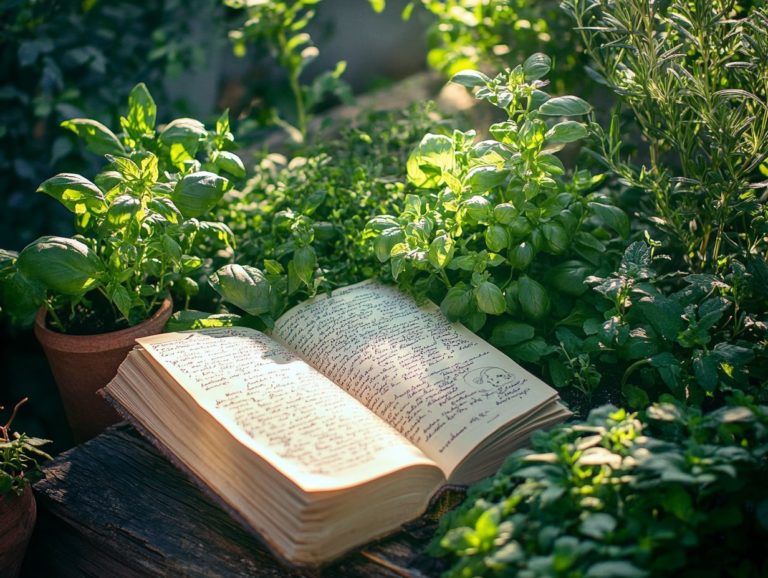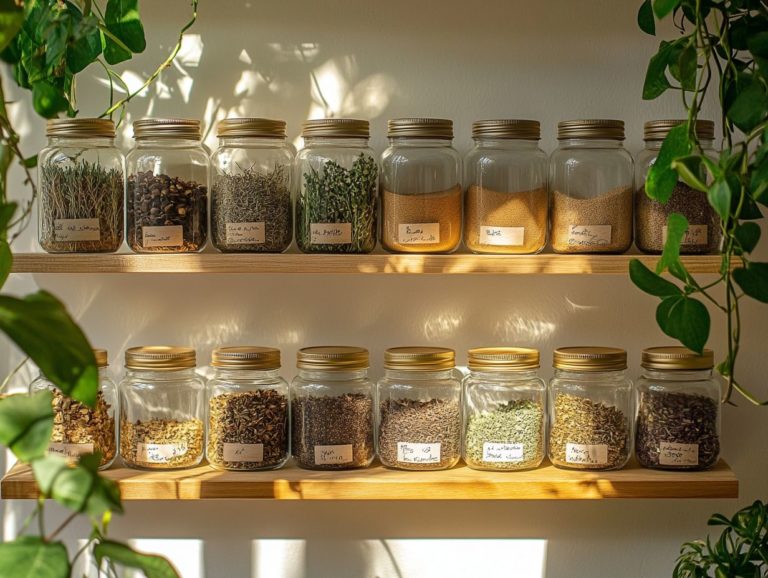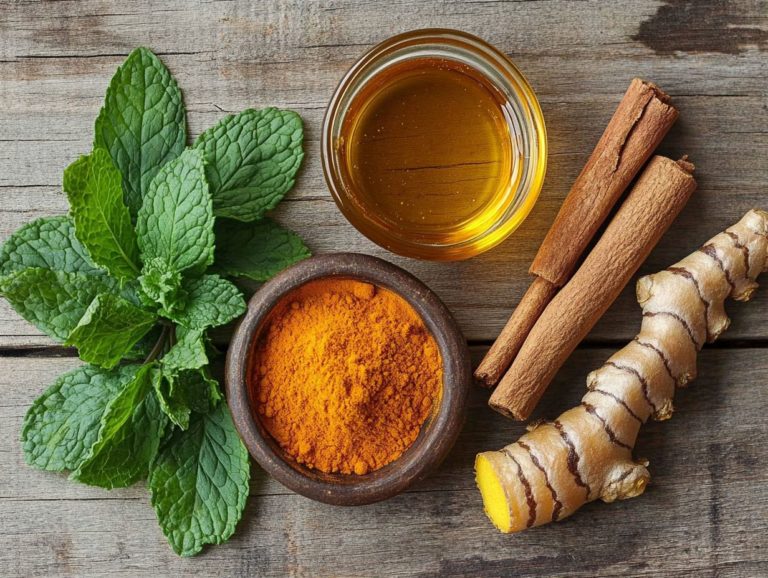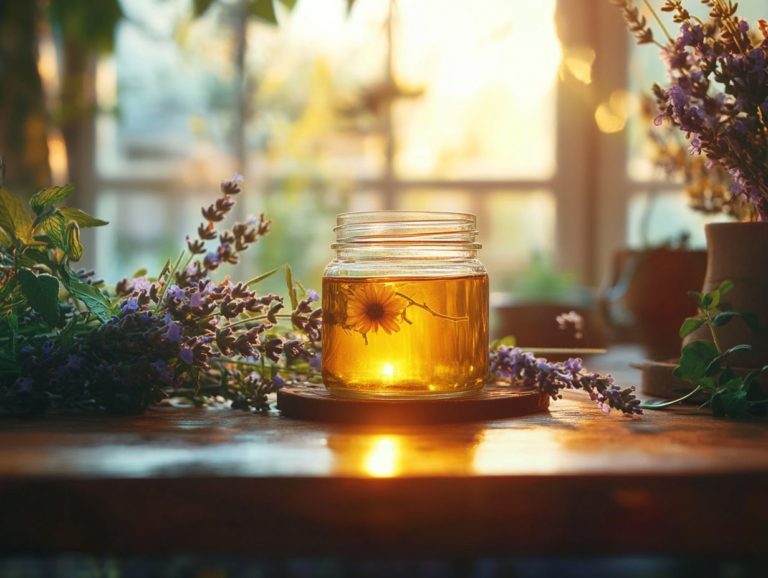Are There Herbal Remedies for Anxiety?
Anxiety is a common challenge that impacts millions. It often shows through both emotional and physical symptoms. If you seek relief, you may turn to herbal remedies. These remedies might offer a natural solution that suits you.
This article delves into the essence of anxiety, exploring its effects on the body while spotlighting popular herbal options that may offer you some respite. You will learn about the effectiveness of these remedies, the potential risks involved, and how they can seamlessly integrate into an overall treatment plan.
Join us now as we explore the exciting world of herbal solutions for anxiety.
Contents
- Key Takeaways:
- Understanding Anxiety
- Common Herbal Remedies for Anxiety
- Effectiveness of Herbal Remedies for Anxiety
- Potential Risks and Side Effects
- Combining Herbal Remedies with Other Treatments
- Frequently Asked Questions
- Are There Herbal Remedies for Anxiety?
- What are some examples of herbal remedies for anxiety?
- How do herbal remedies for anxiety work?
- Are herbal remedies safe to use for anxiety?
- How long does it take for herbal remedies for anxiety to work?
- Can herbal remedies for anxiety be used in conjunction with other treatments?
Key Takeaways:
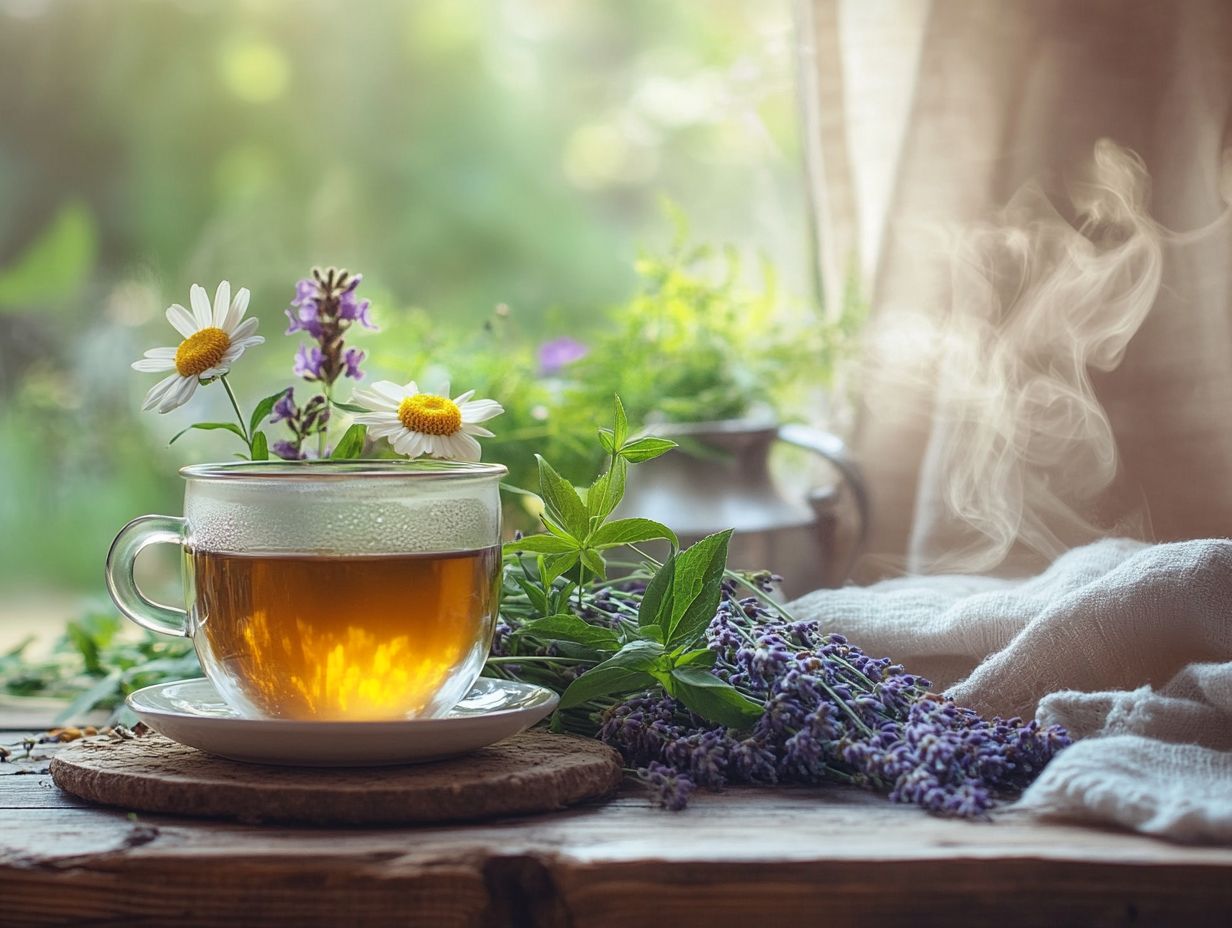
- Herbal remedies can be effective in managing anxiety, but it’s important to understand what anxiety is and how it affects the body before considering them as a treatment option.
- Popular herbal options for anxiety include chamomile, lavender, and passionflower. Consult with a healthcare professional and be aware of potential risks and side effects before trying these remedies.
- While herbal remedies may be helpful, they should not replace professional treatment. Combining herbal remedies with other treatments, such as therapy and medication, may provide a more effective approach to managing anxiety.
Understanding Anxiety
Understanding anxiety is essential for recognizing its profound impact on mental health. This complex condition includes various disorders, such as generalized anxiety disorder and panic disorder, each capable of significantly affecting your well-being and daily functioning.
Anxiety often presents through a range of symptoms, including excessive worry, tension, and even physical manifestations, disrupting both your personal and professional life.
In today’s fast-paced world, exploring the different facets of anxiety is vital. This knowledge allows you to grasp its nuances and discover effective strategies for management.
What is Anxiety and How Does it Affect the Body?
Anxiety is more than just a fleeting emotion; it’s a mental health condition that triggers a physiological response in your body. This response influences everything from your heart rate to muscle tension, bringing on symptoms like sweating and dizziness.
When you experience anxiety, your body instinctively gears up to face or flee from perceived threats a response known as fight-or-flight. This reaction escalates adrenaline levels, sharpening your alertness and energy. However, it can also cause muscles to tense and breathing to quicken, potentially leading to sensations of lightheadedness or heart palpitations.
Recognizing these physiological signs is essential; they are vital indicators of how anxiety manifests in your body. By becoming attuned to these reactions, you can better manage your anxiety and work towards alleviating the stressors that contribute to it. Additionally, exploring whether herbal remedies can help with insomnia may also support your overall well-being.
Common Herbal Remedies for Anxiety
You will find that common herbal remedies for anxiety include a range of natural solutions that have been cherished for centuries to foster relaxation and enhance mental well-being.
Notable herbal supplements such as kava kava, passionflower, lemon balm, and chamomile tea have garnered significant attention for their promising potential in alleviating anxiety symptoms.
Overview of Popular Herbal Options
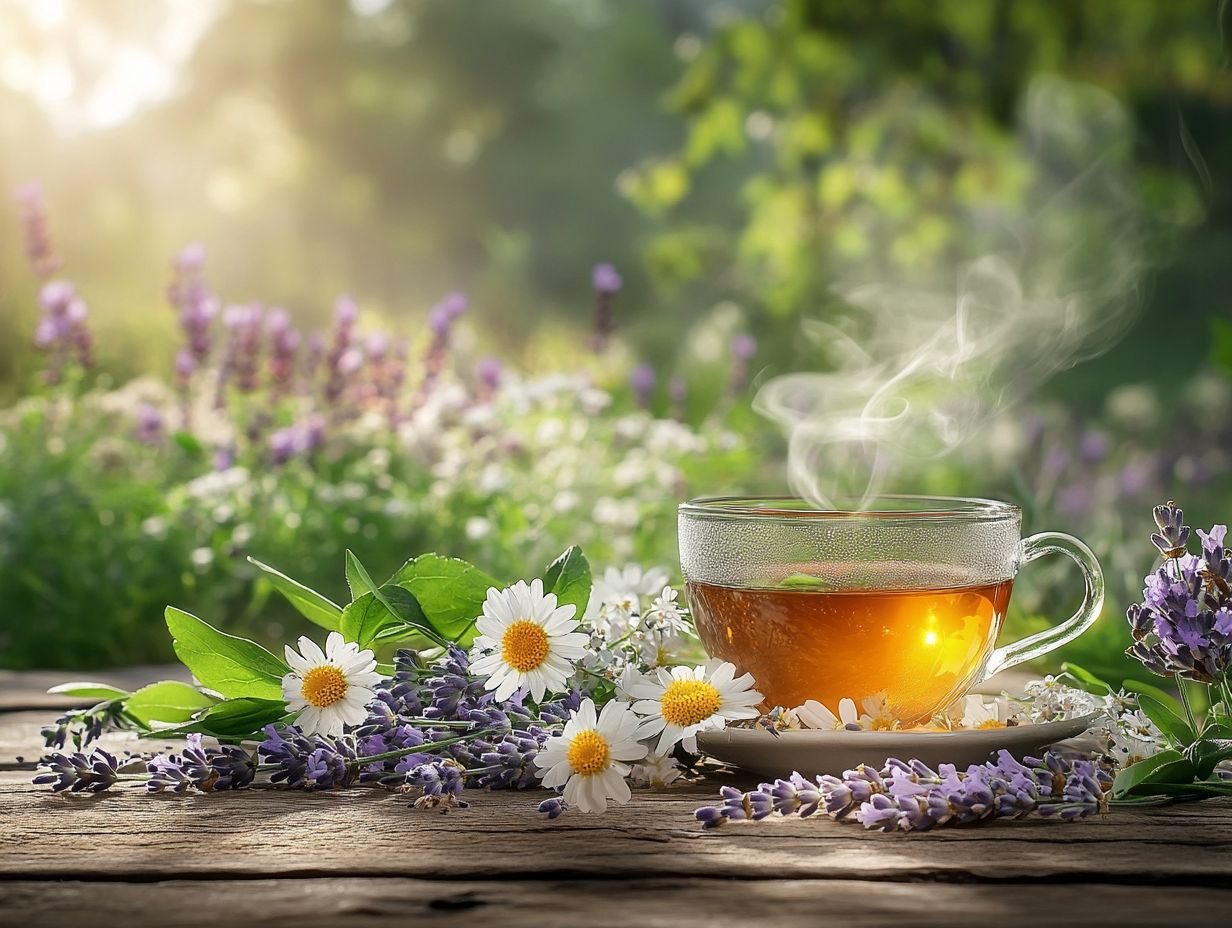
Popular herbal options for anxiety include kava kava, renowned for its calming effects, passionflower, which may help alleviate anxiety symptoms, lemon balm, prized for its relaxing properties, and chamomile tea, frequently sipped for its soothing qualities.
These herbs have earned their place not only in modern wellness trends but also in traditional medicine, with deep roots across various cultures. Research indicates that kava kava can foster feelings of relaxation without sacrificing mental clarity. For those curious about the potential of herbal solutions, you might wonder, can herbal remedies replace prescription meds? This makes it an appealing choice for those seeking natural relief.
Meanwhile, passionflower has caught your attention for its potential to enhance sleep quality, directly addressing anxiety-related distress. Lemon balm, often enjoyed in teas or supplements, has properties that can elevate your mood and boost cognitive function. Chamomile, with its long-standing reputation for stress relief, remains a favorite for those looking for comfort in a cup.
This growing preference for natural remedies shows a shift towards holistic health approaches. It underscores the importance of understanding the benefits and traditional uses of these remarkable herbs.
Effectiveness of Herbal Remedies for Anxiety
The effectiveness of herbal remedies for anxiety has captured attention in many studies. Results show promise for various options.
Kava kava, passionflower, and CBD products derived from hemp are particularly noteworthy, as they are increasingly recognized for their anxiety-relieving properties. If you’re curious about the efficacy of such treatments, you might wonder if there is scientific evidence for herbal remedies.
Evidence and Studies on Herbal Remedies
Research shows strong evidence about the effectiveness of various herbal remedies. Kava kava, passionflower, and valerian root can help reduce anxiety symptoms.
In a 2015 meta-analysis published in Neurotherapeutics, researchers delved into numerous clinical trials focusing on kava kava. They concluded that its anxiety-reducing effects are significant, although they advised caution due to potential liver problems. For those seeking natural alternatives, exploring what herbs are best for stress relief can be beneficial.
A study in the Journal of Clinical Psychology found that passionflower demonstrated comparable effectiveness to conventional treatments, offering a natural alternative. Valerian root, often sought for its sedative effects, was examined in a study highlighted by the Mayo Clinic, which discovered that it can enhance sleep quality, thereby indirectly benefiting those with anxiety. For those interested in exploring more about natural options, understanding what herbal remedies are can be quite beneficial.
These findings suggest that herbal remedies can indeed play a vital role in managing anxiety, especially when tailored to meet individual needs.
Potential Risks and Side Effects
While herbal remedies have the potential to provide relief from anxiety, be mindful of the possible risks and side effects that may accompany their use. Some remedies might cause adverse reactions or interact with other medications.
Considerations Before Trying Herbal Remedies
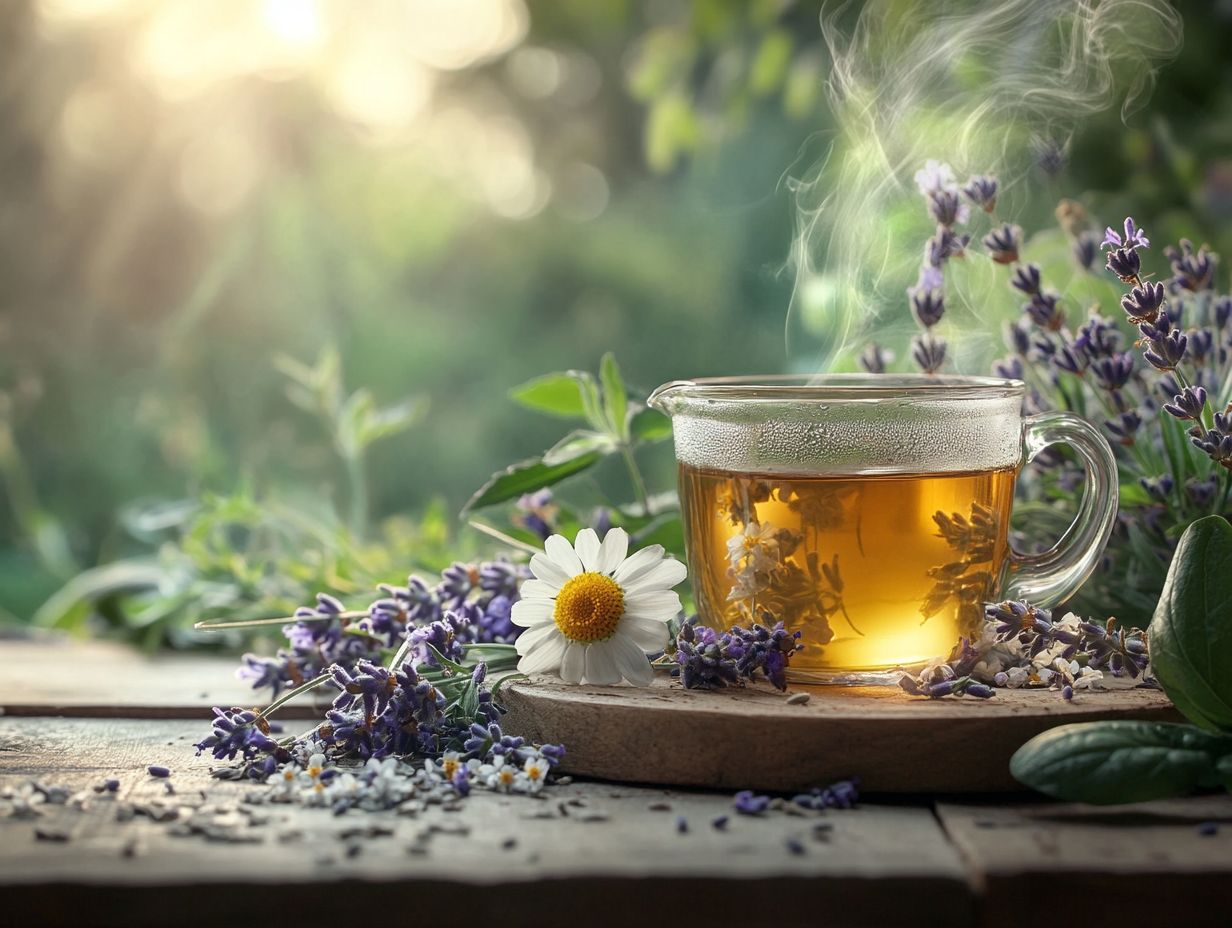
Before trying herbal remedies, act quickly to consider your individual health conditions, potential side effects, and the possibility of interactions with other medications to ensure both safety and effectiveness.
It’s equally important to understand that not all herbal treatments are suitable for everyone; what may alleviate anxiety for one person could actually worsen symptoms for another. For those seeking natural solutions, herbal tea for anxiety relief can be beneficial, but these remedies should never be a substitute for professional medical advice.
Talking to your healthcare provider is crucial, as they can offer insights tailored specifically to your health profile. They can help you navigate the complexities of integrating herbal options with your existing treatment plan. If you’re considering alternative treatments, it’s worth exploring whether herbal remedies can help with allergies. Being mindful of your mental health history can guide your choice of remedies and facilitate informed discussions with medical professionals, ensuring a holistic approach to your mental wellness.
Combining Herbal Remedies with Other Treatments
Discover how combining herbal remedies with other treatments can supercharge your journey to better mental health! Combining herbal remedies with other anxiety treatments, such as cognitive behavioral therapy (a type of therapy that helps you change negative thought patterns) and mindfulness meditation, can significantly enhance their overall effectiveness.
This integrated approach fosters a complete approach for managing anxiety symptoms, ensuring you address both the mind and body in your journey toward well-being.
Possible Interactions and Recommendations
Understanding the potential interactions between herbal remedies and other treatments for anxiety is essential for your safety and for maximizing the benefits of a combined approach.
You might not realize that certain herbs, like St. John’s Wort or kava, can interfere with your prescribed medications. For instance, St. John’s Wort might reduce the efficacy of your antidepressants, while kava could amplify the sedative effects of your anti-anxiety medications.
To minimize these risks, it s vital for you to consult your healthcare provider before adding any herbal supplements to your regimen. Don t wait! Speak with your healthcare provider today before starting any herbal supplements.
Maintaining an open line of communication about all forms of treatment can help create a more effective management plan, ensuring that both conventional and natural remedies work in harmony for your well-being.
Frequently Asked Questions
Are There Herbal Remedies for Anxiety?
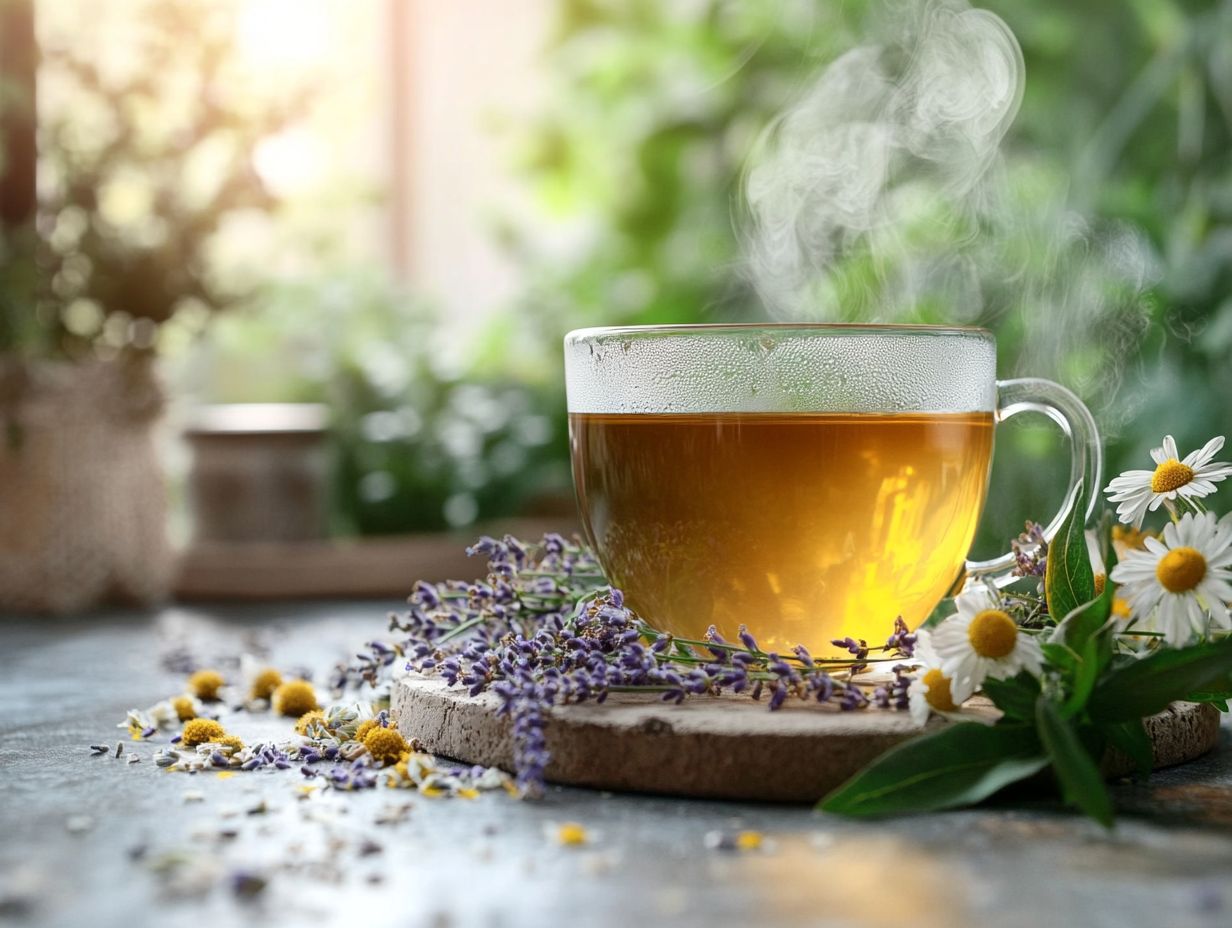
Yes, there are several herbal remedies that have been found to be effective in reducing anxiety symptoms.
What are some examples of herbal remedies for anxiety?
Some examples include passionflower, valerian root, kava, and chamomile.
How do herbal remedies for anxiety work?
Herbal remedies help ease anxiety by affecting brain chemicals that promote calmness and reduce feelings of stress relief from anxiety symptoms.
Are herbal remedies safe to use for anxiety?
In general, herbal supplements are considered safe. However, it is important to consult with a healthcare professional before trying any new herbal remedy, especially if you are taking other medications, particularly CBD products or essential oils.
How long does it take for herbal remedies for anxiety to work?
The length of time it takes for herbal remedies for anxiety disorders to work varies depending on the individual and the specific herb being used, such as kava kava or passionflower. Some people may experience relief within a few days, while others may take longer.
Can herbal remedies for anxiety be used in conjunction with other treatments?
You can use herbal remedies alongside other treatments for anxiety, such as cognitive behavioral therapy or medication. However, it is important to discuss this with a healthcare professional to ensure there are no potential interactions with medications like CBD or herbal supplements.


